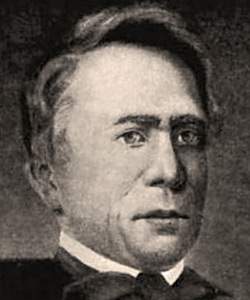Wilson Shannon (Congressional Biographical Directory)
Reference
SHANNON, Wilson, (brother of Thomas Shannon), a Representative from Ohio; born at Mount Olivet, Belmont County, Ohio, February 24, 1802; attended Ohio University, Athens, Ohio, 1820-1822 and Transylvania College, Lexington, Ky., in 1823; studied law; was admitted to the bar in 1830 and began practice in St. Clairsville, Ohio; unsuccessful candidate for election in 1832 to the Twenty-third Congress; prosecuting attorney for Belmont County 1833-1835; State prosecuting attorney in 1835; Governor of Ohio 1838-1840; unsuccessful candidate for Governor in 1840; again Governor of Ohio 1842-1844; unsuccessful candidate for the United States Senate in 1842; United States Minister to Mexico in 1844 and 1845; elected as a Democrat to the Thirty-third Congress (March 4, 1853-March 3, 1855); was not a candidate for renomination in 1854; Governor of Kansas Territory in 1855 and 1856; engaged in the practice of law in Lawrence, Kans., where he died August 30, 1877; interment in Oak Hill Cemetery.
"Shannon, Wilson," Biographical Directory of the United States Congress, 1774 to Present, http://bioguide.congress.gov/scripts/biodisplay.pl?index=S000291.
Wilson Shannon (American National Biography)
Scholarship
In 1849, infected with gold fever, [Wilson Shannon] organized and financed an expedition of sixty "Argonauts" to California. Sacramento yielded no riches, and he returned to Ohio in 1851. Persuaded to run for Congress in 1852, he won easily and voted for the Kansas-Nebraska Bill in 1854, basing his decision on adherence to party, commitment to popular sovereignty, and diffidence to slavery's expansion.
Trouble began in Kansas almost immediately. Although territorial governor Andrew Reeder guaranteed fair elections, Missourian "border ruffians" illegally elected a proslavery territorial legislature in March 1855. Reeder begged President Franklin Pierce to uphold popular sovereignty, but the president cashiered him, replacing him with Shannon on 10 August 1855. Although well-meaning, Shannon erred by aligning with proslavery forces upon arrival. On 1 September he declared publicly that the territorial legislature was legal and that he would enforce its decrees. Inaccurately reporting that Shannon had advocated slavery in Kansas, antislavery journalist James Redpath dealt a devastating blow to Shannon's prestige. However, the proslavery tint to Shannon's policies was unmistakable, and he did consider opposition to established territorial law to be revolutionary. In response to free-state settlers' repudiation of the "bogus" legislature and their determination to elect their own government, Shannon on 14 November chaired the proslavery "law and order" convention, which pledged to "crush" the traitors.
Trouble began in Kansas almost immediately. Although territorial governor Andrew Reeder guaranteed fair elections, Missourian "border ruffians" illegally elected a proslavery territorial legislature in March 1855. Reeder begged President Franklin Pierce to uphold popular sovereignty, but the president cashiered him, replacing him with Shannon on 10 August 1855. Although well-meaning, Shannon erred by aligning with proslavery forces upon arrival. On 1 September he declared publicly that the territorial legislature was legal and that he would enforce its decrees. Inaccurately reporting that Shannon had advocated slavery in Kansas, antislavery journalist James Redpath dealt a devastating blow to Shannon's prestige. However, the proslavery tint to Shannon's policies was unmistakable, and he did consider opposition to established territorial law to be revolutionary. In response to free-state settlers' repudiation of the "bogus" legislature and their determination to elect their own government, Shannon on 14 November chaired the proslavery "law and order" convention, which pledged to "crush" the traitors.
Graham Alexander Peck, "Shannon, Wilson," American National Biography Online, February 2000, http://www.anb.org/articles/04/04-00901.html.
Wilson Shannon, Mexican War (American National Biography)
Scholarship
In April 1844 [Wilson Shannon] resigned the [Ohio] governorship after President John Tyler nominated him as minister plenipotentiary to Mexico.
The Mexican government refused to recognize the independence of Texas and insisted that its annexation by the United States would constitute a declaration of war. Undeterred, Secretary of State John C. Calhoun armed Shannon with instructions denying Mexico's claim to Texas and later had Shannon warn the Mexicans against attempting to reconquer Texas. When the Mexican foreign minister charged the U.S. government with conspiratorially abetting Texas's treasonable revolt, Shannon demanded a retraction. After several bitter exchanges, Shannon precipitously suspended diplomatic relations. From November 1844 to May 1845, during which time Texas was annexed by a joint congressional resolution, the United States had no official communication with Mexico. President James K. Polk dismissed Shannon in March 1845 but could not rescind his tactlessness.
The Mexican government refused to recognize the independence of Texas and insisted that its annexation by the United States would constitute a declaration of war. Undeterred, Secretary of State John C. Calhoun armed Shannon with instructions denying Mexico's claim to Texas and later had Shannon warn the Mexicans against attempting to reconquer Texas. When the Mexican foreign minister charged the U.S. government with conspiratorially abetting Texas's treasonable revolt, Shannon demanded a retraction. After several bitter exchanges, Shannon precipitously suspended diplomatic relations. From November 1844 to May 1845, during which time Texas was annexed by a joint congressional resolution, the United States had no official communication with Mexico. President James K. Polk dismissed Shannon in March 1845 but could not rescind his tactlessness.
Graham Alexander Peck, "Shannon, Wilson," American National Biography Online, February 2000, http://www.anb.org/articles/04/04-00901.html.



